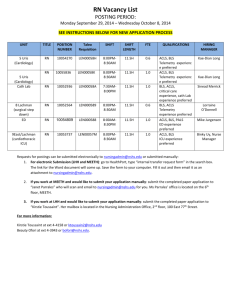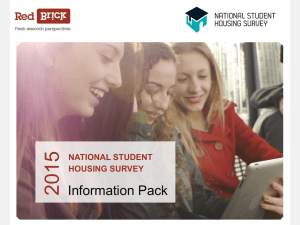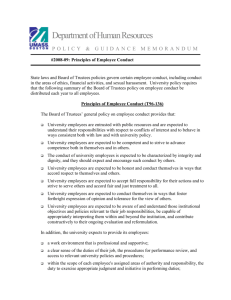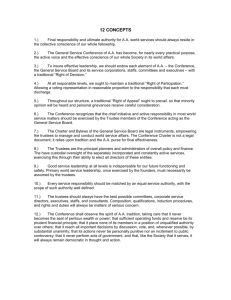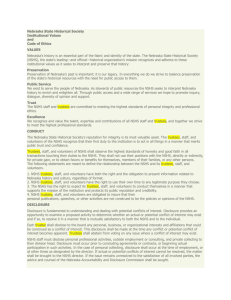5. Role of the Board of Trustees - Nebraska State Historical Society
advertisement
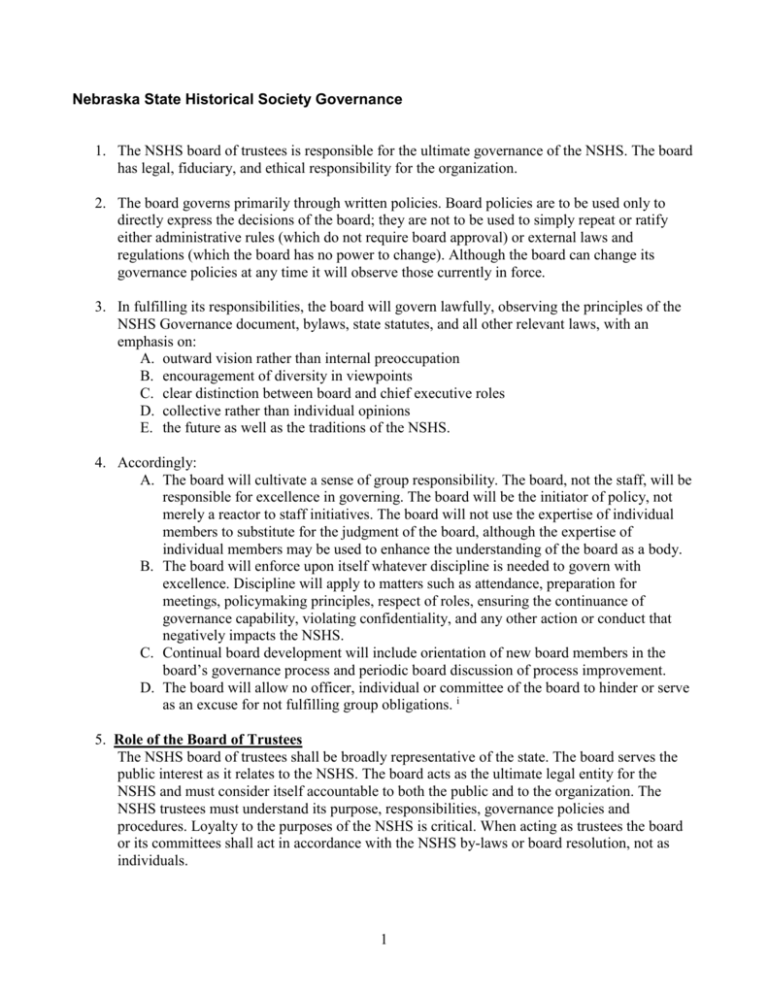
Nebraska State Historical Society Governance 1. The NSHS board of trustees is responsible for the ultimate governance of the NSHS. The board has legal, fiduciary, and ethical responsibility for the organization. 2. The board governs primarily through written policies. Board policies are to be used only to directly express the decisions of the board; they are not to be used to simply repeat or ratify either administrative rules (which do not require board approval) or external laws and regulations (which the board has no power to change). Although the board can change its governance policies at any time it will observe those currently in force. 3. In fulfilling its responsibilities, the board will govern lawfully, observing the principles of the NSHS Governance document, bylaws, state statutes, and all other relevant laws, with an emphasis on: A. outward vision rather than internal preoccupation B. encouragement of diversity in viewpoints C. clear distinction between board and chief executive roles D. collective rather than individual opinions E. the future as well as the traditions of the NSHS. 4. Accordingly: A. The board will cultivate a sense of group responsibility. The board, not the staff, will be responsible for excellence in governing. The board will be the initiator of policy, not merely a reactor to staff initiatives. The board will not use the expertise of individual members to substitute for the judgment of the board, although the expertise of individual members may be used to enhance the understanding of the board as a body. B. The board will enforce upon itself whatever discipline is needed to govern with excellence. Discipline will apply to matters such as attendance, preparation for meetings, policymaking principles, respect of roles, ensuring the continuance of governance capability, violating confidentiality, and any other action or conduct that negatively impacts the NSHS. C. Continual board development will include orientation of new board members in the board’s governance process and periodic board discussion of process improvement. D. The board will allow no officer, individual or committee of the board to hinder or serve as an excuse for not fulfilling group obligations. i 5. Role of the Board of Trustees The NSHS board of trustees shall be broadly representative of the state. The board serves the public interest as it relates to the NSHS. The board acts as the ultimate legal entity for the NSHS and must consider itself accountable to both the public and to the organization. The NSHS trustees must understand its purpose, responsibilities, governance policies and procedures. Loyalty to the purposes of the NSHS is critical. When acting as trustees the board or its committees shall act in accordance with the NSHS by-laws or board resolution, not as individuals. 1 6. Process: Individuals may be nominated to the Board of Trustees by the nominating committee or may submit their names in writing to the nominating committee by a specified deadline. The Board of Trustees consists of twelve members elected by the Society membership, and three members appointed by the governor of the state of Nebraska. Trustees are elected and appointed from each congressional district. 7. Term: Individuals may serve no more than two consecutive three-year terms, but are again eligible for election or appointment to the board after a break in service of at least three years. 8. Meetings: Board meetings are held at least quarterly (generally 4-5 times a year). Committee meetings and site visits are usually scheduled prior to a board meeting. 9. Expenses: Board members are not paid for their services, but are eligible for reimbursement for actual expenses incurred in performance of their official duties. 10. Board Duties--What are the board’s obligations? Under well-established principles of law, a board member must meet certain standards of conduct and attention in carrying out his or her responsibilities. These are usually described as the duty of care, the duty of loyalty, and the duty of obedience. A. Duty of care describes the level of competence that is expected of a board member, and is commonly expressed as the duty of “care that an ordinarily prudent person would exercise in a like position and under similar circumstances.” This means that a board member has the duty to exercise reasonable care when he or she makes a decision as a steward of the organization. B. Duty of loyalty is a standard of faithfulness; a board member must give undivided allegiance when making decisions affecting the organization. This means that a board member can never use information obtained as a member for personal gain or for any other reason that is not in the best interest of the organization. C. Duty of obedience requires board members to be faithful to the organization’s mission. They are not permitted to act in a way that is inconsistent with the central goals of the organization or the law.ii 11. Board Responsibilities--How does the board carry out its duties? A. Determine the Society’s mission and making appropriate long-range plans to achieve it. B. Secure leadership for the NSHS C. Board of Trustees D. Director/CEO E. Act to ensure that the NSHS has adequate resources and support to carry out its mission. F. Delegate to the Director/CEO full authority for the day-to-day management of the NSHS. G. Help to raise funds to support NSHS program activities. 2 H. I. J. Advocate for the NSHS all across the state. Provide oversight to ensure that the NSHS maintains accountability and a favorable legal status. Adopt and promulgate all policies, rules, and regulations, not inconsistent with law, that are necessary to implement the objects and purposes of the society. 12. Board Meetings—What happens at board meetings? Generally, the NSHS board of trustees meets four times per year. At meetings the board will: A. review progress toward meeting the NSHS’s stated goals and objectives; B. hear reports of various committees and staff and take necessary action; C. make appropriate policy decisions as required (by passage of motion or resolution, via roll-call vote); D. provide oversight and give guidance to various NSHS committees as required; E. plan; F. coordinate; G. communicate; H. legitimize; I. fulfill legal and other requirements for board meetings. 13. Board Functions—What is the board’s work? Although the day-to-day management responsibilities lie with the Director/CEO, the board holds the ultimate decision-making powers for the organization. It is important to distinguish between the role of the board and that of individual board members. While the board has the collective responsibility for organizational oversight and establishing policy, individual board members take on roles in performing committee work, public outreach, and fund-raising. Individual board members do not possess the power to make decisions on behalf of the board; only the board as a whole can make decisions on behalf of the organization. The work of the board is accomplished in accordance with these precepts: A. The NSHS board of trustees formulates the NSHS mission, vision, and institutional values through focus on strategic issues and policy development. B. The NSHS board deliberates issues and makes decisions as a total body. No individual board member or committee, except the executive committee, has authority to take action on the board’s behalf. C. Board decisions are reached by majority vote of all board members voting, acting as individuals. Once decisions are reached, it is important that the board speaks with one voice. D. Responsibility and authority for the day-to-day management and operations of the NSHS are vested in the agency director/CEO in accordance with state law and the board’s direction. 3 E. Only the NSHS president and/or the director/CEO, or his/her representative, not individual board members, may represent the NSHS to the media. F. The NSHS board of trustees shall receive, review, and approve the NSHS’s biennial budget request prior to submission to the legislature and shall adopt an annual operating budget. G. Periodically, the NSHS board of trustees shall evaluate its effectiveness. 14. Board Administrative Structure—How does the board do its work? A. NSHS Officers The NSHS board of trustees shall annually elect the following officers: a. President: The President of the board shall preside at all meetings of the board of trustees and the executive committee; shall appoint all committees and chairs, and shall be an ex-officio member of all committees, the NSHS Foundation executive board, and the State Historic Preservation Board. b. First Vice President: The first vice president shall perform the duties of the president of the board of trustees when the president is absent or unable to act, and perform other duties that may be assigned by the president of the board. c. Second Vice President: The second vice president shall perform the duties of president when neither the president nor the first vice president is available to fulfill such duties, and shall perform other duties that may be assigned by the president. d. Treasurer: The treasurer shall present a summary of the NSHS financial report during the annual NSHS members’ meeting and serves on the budget and finance committee. e. Secretary: The NSHS director/CEO shall serve as non-voting secretary to the board. The Director shall ensure the official recording of the minutes of all board of trustee and committee meetings and shall publish the notice of all board of trustee meetings. The secretary/director/CEO also shall attend committee meetings except the director’s evaluation committee meeting. f. Executive committee: The officers of the board of trustees, except the secretary, shall serve as members of the executive committee. B. Board Committees Nebraska law requires that the NSHS shall annually appoint a nominating committee. The law further provides for the NSHS board of trustees “to create such committees as the board deems advisable and delegate to the committees those functions which aid in efficient administration of the affairs of the NSHS.” 4 Committees serve in an advisory capacity and make recommendations to the board as a whole. Committees may not act for the board unless specifically empowered by the full board to do so. The NSHS has established the following committees, which will report at each board meeting: a. Executive Committee The officers of the NSHS board of trustees (president, first vice president, second vice president, and treasurer) serve as members of the executive committee. This committee has the authority to act on behalf of the entire board of trustees when necessary, however, such actions require subsequent ratification by the board at its next meeting. The committee will prepare preliminary agendas for board meetings, to be distributed in advance for comment by the board as a whole, and will identify those items that may require action. b. Nominating and Board Development Committee – The nominating and board development committee seeks out and nominates individuals from each of Nebraska’s three congressional districts to serve on the NSHS board of trustees. This committee also prepares and presents a slate of candidates for the board of trustees’ officer election and develops on-going training and orientation opportunities for board and committee members. c. Planning Committee – The planning committee provides oversight for the NSHS strategic planning process, and reviews major new projects. d. Director’s Evaluation Committee – The director’s evaluation committee annually reviews the job performance of the NSHS director/CEO in accordance with procedures adopted by the board. e. Membership and Development Committee – The NSHS membership committee will work in concert with the NSHS Foundation. This committee works to encourage membership development and financial support of the NSHS. f. Budget and Finance Committee – The group reviews the NSHS biennial budget request and annual operating budget and works with staff to prepare budget summaries for board approval. g. Governance Committee—The governance committee will on a continuing basis evaluate the effectiveness of the board and its policies, rules, and regulations to ensure they are not inconsistent with law and standards of board conduct. Note: Additional information regarding committee responsibilities and operations can be found in the committee section of this manual. 15. Individual Board Member Responsibilities—How does each board member contribute? A. Attend board and committee meetings and functions. 5 B. C. D. E. F. G. H. I. J. K. L. M. Be informed about the organization’s mission, services, policies, and programs. Review agenda and supporting materials prior to board and committee meetings. Serve on committees and be willing to take on special assignments. Be a current member of the NSHS. Inform others about the organization. Suggest possible nominees to the board who can make significant contributions to the work of the board and the organization. Follow conflict-of-interest and confidentiality policies. Understand and respect the different roles of the board and of staff. Assist the board in carrying out its fiduciary responsibilities. Sign and comply with the board code of conduct and follow policies and procedures outlined in the NSHS Governance document. Contact the CEO to communicate questions, suggestions or concerns relating to issues of the NSHS and to make requests for information or assistance from the staff. Contribute to the positive operation of the NSHS. 16. Legal Representation The Attorney General of the State of Nebraska serves as the NSHS legal counsel. Requests for legal advice as well as formal opinions are made by the president and/or CEO as they deem necessary, at the direction of the board as a whole, or at the request of board committees.iii 17. Risk Management NSHS Board members in good-faith performance of their duties are covered by indemnification provisions of state statute for acts and omissions.iv Approved by NSHS Board 10-14-2005 Sections 1-5 are adapted in part from Miriam Carver and Bill Charney’s The Board Member’s PlayBook: Using Policy Governance to Solve Problems, Make Decisions, and Build a Stronger Board (Jossey-Bass, 2004). ii Nebraska Statutes §21-1986 Standards for directors; §21-2095 Standards of conduct for directors; §21-20,114 Directors; conflict of interest; directors’ action iii Consultation with Fred Neid, attorney assigned to NSHS by Office of the Attorney General, [5-05]. iv Memo [3-20-05] from Laura Peterson, Risk Manager, State Department of Administrative Services, citing Attorney General Opinion 92058. i Board Orientation Manual.Governance.adopted by board on 10.14.2005 6

